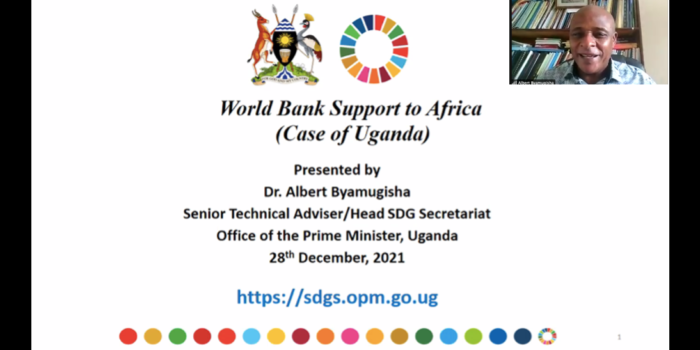Ogawa-seminar Graduation Party, March 2014
The above captioned party was held on Wednesday 26th March 2014 in a BBQ restaurant near Kobe University, to celebrate with thirteen new graduates who studied under Professor Ogawa’s seminar....
Graduate School of International Cooperation Studies (GSICS), Kobe University


As one of the “World Bank and the Sustainable Development Goals” (SDGs) series, on December 28th, 2021, Dr. Albert Byamugisha, senior technical advisor Uganda prime minister’s office gave a lecture on the theme “World Bank support in Africa:Case of Uganda. Dr Byamgisha introduced following five key supports from the World Bank in Sub-Saharan Africa; (1) saving lives (ex: Building health system), 2) protecting poor people (ex: social safety net program), 3) protecting and creating jobs, 4) supporting making policy, and 5) providing research and analysis.
Furthermore, Dr Byamugisha introduced the Bank support for sustainable development of Uganda such as financial support, sharing knowledge and providing zero interest loan and grants. It has the largest proportion (22%) of loans of all the externally funded projects implemented in Uganda. Among the many projects implemented in Uganda, he described key projects, such as a teacher training program for early childhood education, textbook support, improvement learning outcome, and nutrition/health programs.
Dr. Byamugisha pointed out that Millennium Development Goals (2000-2015), focused on only developing countries, but SDGs are targeting all member states and supporting three main aspects: economy, society, and the environment. He noted that Uganda, led by Dr. Byamugisha, had developed a National Coordination Framework to achieve the SDGs, and a new National SDGs road map to respond to the new coronavirus pandemic. These frameworks can be useful not only for education policy in Uganda, but also for cooperation with other sectors in Uganda, and for cross-sectoral cooperation.
He concluded his lecture by saying that it is vital for the government to develop high quality and inclusive development planning in order to achieve SDGs, the National Development Plan II, and VISION 2040. I would like to take this opportunity to thank Dr. Byamugisha for taking time out of his busy schedule to give us this insightful lecture.
Authored by: Kohei Uno (Master Student)
Related Link: Seminar Information